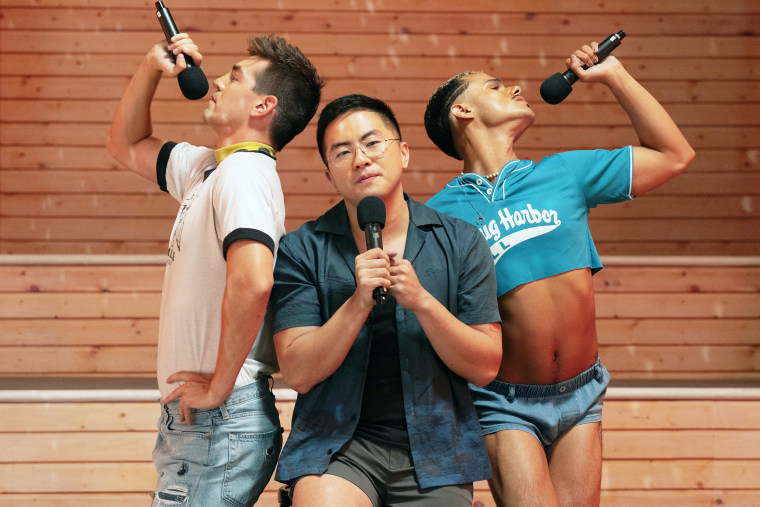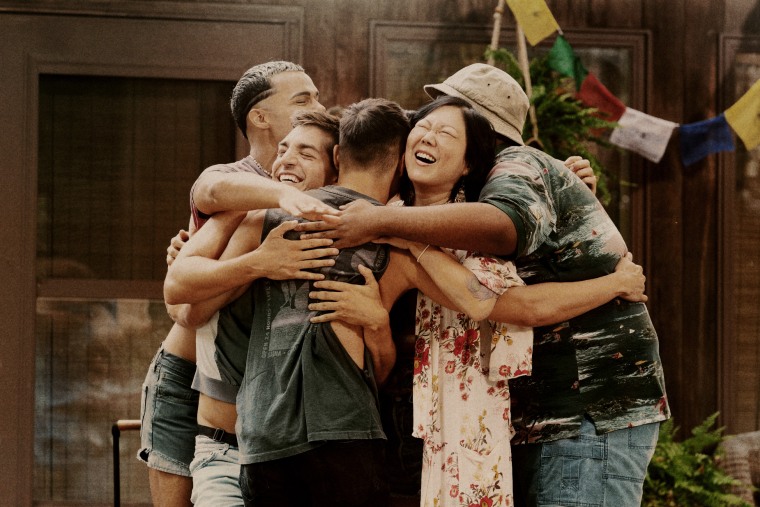For decades, Fire Island — the 32-mile barrier island that lies off the southern coast of New York’s Long Island — has become an invaluable haven for members of the LGBTQ community. And in rising comedian Joel Kim Booster’s screenwriting debut, the picturesque enclave serves as the colorful backdrop for a thorough examination of race, class and sexuality in a modern-day — and unapologetically queer — take on Jane Austen’s “Pride and Prejudice.”
Directed by Andrew Ahn (“Spa Night,” “Driveways”), “Fire Island” follows two best friends, Noah (Booster) and Howie (Bowen Yang), who flock to the Pines, a queer hamlet on the larger island, every summer with their friends — Luke (Matt Rogers), Keegan (Tomás Matos) and Max (Torian Miller) — for a week of nonstop parties and hook-ups. But after discovering that their friend, Erin (Margaret Cho), is planning to sell the place they considered a second home, the friends are forced to make what might be their last summer on the island together one for the ages.
A happily single New Yorker, Noah decides to help a hopelessly romantic Howie find the man of his dreams, going as far as to promise that he will remain abstinent until he succeeds. Howie immediately crosses paths with a charming doctor named Charlie (James Scully), but it soon becomes clear that the members of Charlie’s affluent circle — including his best friend, Will (Conrad Ricamora), who catches Noah’s eye — seem to look down on Howie and his eccentric group of friends due to their lack of social status.

“Fire Island” was several years in the making. When Booster took his first ferry to the Pines with Yang and a group of their friends many years ago, he packed a copy of Austen’s beloved Regency-era romance novel in a tote bag. As he began to revisit the storied courtship of Elizabeth Bennet, a young woman sharing a modest estate with her parents and four sisters, and Fitzwilliam Darcy, an aristocratic landowner, Booster was struck by the comparisons that could be drawn between Austen’s observations about class in 19th-century English society and his own experiences as a gay Asian man in the 21st century.
One of the biggest parallels he noticed “was the ways in which people from different classes speak to each other and the coded language that people use to be terrible to one another with plausible deniability about how terrible they’re actually being,” the writer and actor, 34, told NBC News.
“It’s so connected to our modern conception of ‘shade,’ of just being able to say that terrible thing, that terrible insult,” Booster said, adding that it “just felt really powerfully relevant to today, especially when I was reading it on the island — surrounding and living it very viscerally.”
After shelving the idea for years, Booster — who said he has been waiting to write, produce and act in his own content since he was 22 — decided to develop his take on a “Pride and Prejudice” story set on the coast of Fire Island for Quibi, the now-defunct, short-form video streaming service. When the platform folded at the end of 2020, the film studio Searchlight Pictures acquired the rights, turning Booster’s idea into a major motion picture with queer Asian creatives on both sides of the camera.
Last spring, Booster reached out to Ahn — another gay, Korean American creative whom he had met years earlier in the industry — about working together on “Fire Island.” Having spent much of the last year at home due to the Covid-19 pandemic, Ahn said he was immediately drawn to the joy in Booster’s cleverly crafted screenplay, which had the right combination of real-life humor and heart, and resonated deeply with his own personal experiences.
“I was really lonely and I hadn’t seen my friends for a long time and gone to a club to dance and have fun and be stupid, and I saw that queer Asian American joy in Joel’s screenplay,” Ahn said. “It felt so inspiring and exactly what I wanted to spend time doing. I wanted to make something to celebrate my friendships with other queer Asian Americans.”
When writing the script, Booster drew on his own experiences on the island and based much of the friendship between Noah and Howie on his own relationship with Yang, whom he had immediately befriended after moving from the Midwest to New York in his early adulthood.
“Bowen probably read some of the earliest drafts of the script in part because I love and respect him and he gives great notes, but also because I asked Bowen to go to a lot of really intense places in this movie and sort of rehash things that I think he’s moved past as a person in his own life, and so I didn’t want to spring that on him at the table read,” said Booster, who incorporated some of his own real-life conversations with Yang in the script. “I wanted him to be OK with everything that I was asking him to do as a performer, and so he was really, really involved as just a test reader and as a friend early on in the process.”
While Fire Island is his “favorite place to be,” Booster said he didn’t want to shy away from the realities of the queer mecca, leading to a candid and heartfelt exploration of what it means to be both gay and Asian in a place that can be, as he put it, “oppressively white and inherently classist.”
But at the same time, Ahn said, “I really love that Joel’s screenplay, and the film that we crafted, finds a way for us to still find happiness and fulfillment, and I think it has to do with building community and finding solace and joy within friendships, and I think that feels like a way to heal, to find a way to live an authentic and happy life, even in the face of some really terrible things.”
Shot largely on location last summer, “Fire Island” honors the importance of those queer friendships and chosen families — so much so that the director and principal cast decided to stay in a house together during the two weeks they shot on the island.
“My room shared an air vent with Joel’s room, and I could hear [Joel] watching ‘Housewives’ with Matt and Bowen and giggling [their] heads off, and I thought it was so adorable,” Ahn recounted, smiling. “And it reminded me of [the 2005 film] ‘Pride and Prejudice’ where the camera goes from window to window and everybody’s chatting and debriefing about the day. I think it’s that level of closeness and intimacy that you can only have when you share space together, when you work on a project together. We’ll always be bonded by that experience.”
Booster, who admitted that he doesn’t think he will “ever have as much fun making a movie” as “Fire Island,” likened the experience of living under the same roof to going off to summer camp.
“We’re so used to shooting in New York or L.A. and sort of clocking in and clocking out and going home at the end of the day,” Booster added, and there’s “something about clocking out and then suddenly being like, ‘OK, what are we watching tonight? What are we eating?’ … Just to see how they let loose, going to tea with them or sitting by the pool, and just sitting around Margaret while she holds court and tells us all of these amazing stories from her decades in the business — I’m so glad we were able to do that on the island.”
Given that Asian men, regardless of sexuality, have long been characterized as weak, sexless and undesirable in Western media, the ability to find joy in spite of the racism and classism that can arise in a place like Fire Island “was a really long and difficult journey that I had to make for myself,” Booster said.
“For so long, I was so afraid of being in those spaces because I didn’t want to feel undesirable or unwanted,” he added. “But at the end of the day, you really have to make a conscious decision, especially entering a space like Fire Island to say, ‘F— that noise. This belongs to all of us.’ And it’s such a f—ing paradise that, why would you let them win by avoiding it? And that’s sort of the ethos that I wanted to bring to the movie.”
The fact that a major studio is releasing a film with four queer Asian leads, set on an island where everyone is comfortable in their own sexuality, feels radical, Booster and Ahn acknowledged, and shows how far Hollywood has come in terms of Asian and LGBTQ representation in recent years — and how much work there is left to be done.
“My hope is that queer representation, that Asian American representation, separately acknowledge the many intersections of our identity, that we are complicated people that have many different facets to our identities, and I think that that’s more and more what tells the real story of who we are as communities,” Ahn said. “My hope is that people watch ‘Fire Island,’ and it inspires them to understand that their stories are valid and that they can go out there and tell their stories.”
Booster hopes “people don’t just say, ‘Well, there it is! There’s the gay, Asian movie.’ And I hope the industry doesn’t stop the conversation there either,” he said. “I hope this creates a million clones. I hope that if you’re gay and you’re Asian and you don’t see yourself reflected in this movie, that you make your own, or you find a person who you do see yourself represented in and you support that person until they’re able to make their own. I hope that this is just the beginning of the conversation and not the end of it.”
“Fire Island” premieres Friday on Hulu.
